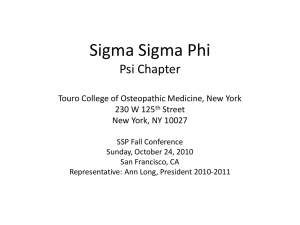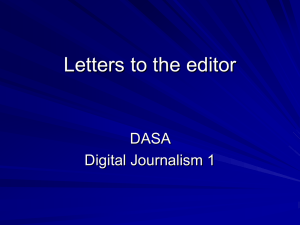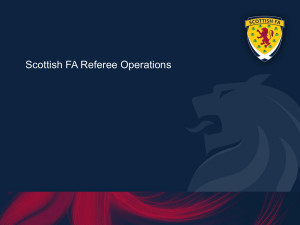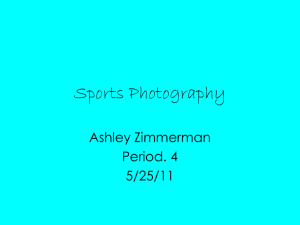Rachel Won - Stanford Optical Society
advertisement
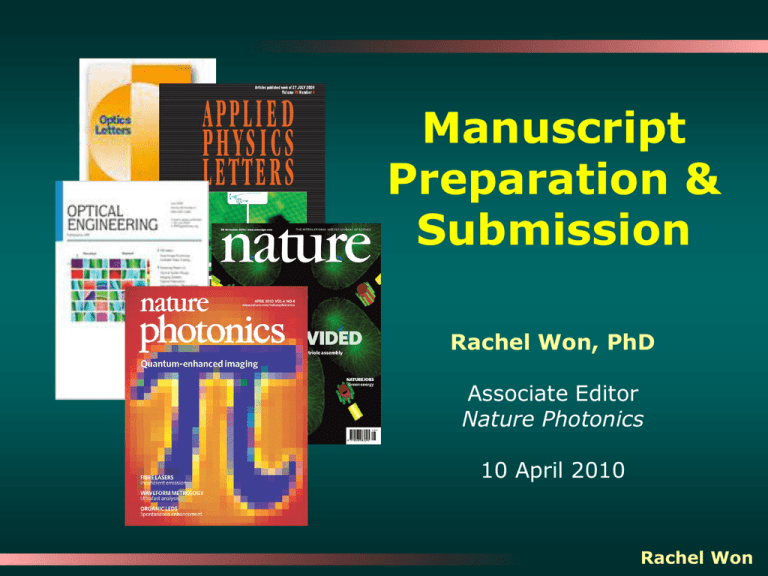
Manuscript Preparation & Submission Rachel Won, PhD Associate Editor Nature Photonics 10 April 2010 Rachel Won Overview • Manuscript preparation • Manuscript submission • Editorial process Rachel Won nature and Nature Research Journals • Flagship journal of Nature Publishing Group • First ever issue was published on 4 November 1869 • The world's most highly cited multidisciplinary science journal • Nature's impact factor for 2008 is 31.434 (IF 2007=28.751) (Source: Journal Citation Reports, Thomson Scientific) Rachel Won NPG’s Physical Sciences Division Nature Materials Launched in 2002 Impact factor 23.132 Nature Physics Launched in Oct 2005 Impact factor 16.821 Nature Nanotechnology Launched in Oct 2006 Impact factor 20.571 Nature Climate Change Nature Photonics Launched in Jan 2007 Impact factor 24.982 Nature Geoscience Launched in Jan 2008 Nature Chemistry Launched in April 2009 To be launched in April 2011 Rachel Won Nature Photonics • A monthly journal from NPG that publishes peerreviewed, top-quality research in all areas of photonics • Contains a unique mixture of research papers, review articles, News and Views pieces, business news and market analysis • Editorial Headquarters in Tokyo www.nature.com/naturephotonics Rachel Won Nature Photonics The Editorial Team Chief Editor Oliver Graydon Tokyo Since Feb 2006 Associate Editor Rachel Won Tokyo Since June 2006 Associate Editor David Pile Tokyo Since Nov 2008 Associate Editor Noriaki Horiuchi Tokyo Since Sept 2009 Rachel Won Manuscript preparation How to get your point across… HINT: Write for both the beginner and the expert Rachel Won Steps to a great paper • Thoughtful research • Thorough preparation • Logical explanation Rachel Won Before writing a paper (Before starting a research topic) • • • • • Why does the topic interest YOU? What was thought/known/done before this work? What are the key findings of your work? What’s the main message for your readers? How does new data change the thinking, or support current approach, or open new avenues or research? Rachel Won What makes a great paper? • • • • • • High degree of novelty or innovation Interesting to a broad range of readers Significant step forward Breakthrough in performance High impact in the field Important advance in scientific understanding that provides new directions for research • Data persuasively supports conclusions Conceptual OR technological advance + interesting + convincing publication Rachel Won Title • • • • Clear and attractive Not too general or vague Not too long but short and precise Does not normally include numbers, acronyms, abbreviations or punctuation • Instead of: “Record electro-optic coefficient of 170 pm/V and V of 1V at 1.55 μm in hybrid crosslinkable polymer/sol-gel waveguide modulators”, why not: “Hybrid polymer/sol-gel waveguide modulators with exceptionally large electro-optic coefficient”? Rachel Won Summary/Introductory paragraph How to lose your reader at the introduction? • Write a thesis instead of an intro • Include too many unrelated branches of thought Hint: • Introduce the field, clearing a path for the reader to follow. Rachel Won Summary/Introductory paragraph • • • The most-read section of any paper Aimed at readers in other disciplines Key points: • One or two broad general statements to orient the reader, set the stage, and provide context • Concise description of results, with mention of methodology used • Major conclusion • How this advances the field - why this is significant for readers Rachel Won Summary/Introductory paragraph More specifically, • 2-3 sentences on basic introduction to the field • a brief account of the background and motivation of the work • one-sentence statement of the main conclusions starting with 'Here we show…' or equivalent phrase • 2-3 sentences putting the main findings into general context Rachel Won Main text • • • • • • Materials Methods Principles Mechanisms Results with displays Discussion Rachel Won Discussion • Comparison to previous work • Theoretical or practical implications • Conclusion regarding the significance of the work • Limitations • Future work Rachel Won Methods • If brief (less than 200 words in total), include them in the text at an appropriate place • Cite a reference to methods published before to save space; with the new addition or variation briefly stated • Can also create a new section called “Methods”; 1000 words, not counted as main text • More information and video/movie clips can be submitted as Supplementary Information Rachel Won Write with the readers in mind! • Focus on a single main question • Plan the content and organization with an outline especially the flow of reasoning • Use simple, direct and concise wording • Check that all parts are connected with persuasive reasoning, appropriate structure, linkage and context Rachel Won Paper writing tips • Write in active voice; for example, “We did…” rather than “It was done…”, “We demonstrate…” • • • • rather than “It is demonstrated…” State the present work in present tense State already published work in past tense Be concise; limited space for a paper; put lengthy method and simulation details in separate sections at the end of the paper if you need more space Express appropriate level of confidence: impossible implausible unlikely plausible possible probable likely certain Rachel Won Paper writing tips • Do not extend your conclusions beyond those that are directly supported by your results • Clearly put your work into context, explain the importance of your findings in relationship to previous papers • Give potential impact and future work • Make sure that you reference relevant previous literature Rachel Won Things to avoid… • Vague titles • Hype • Fairy tales • Claims without sufficient evidence • Poor referencing • Poor-quality figures Rachel Won Manuscript Submission Rachel Won Which journal? • Nature is for broadest or deepest impact • Research journals overlap • Depends on the editorial scope of the journal and your target audience … Rachel Won Presubmission enquiry Ask us! • All Nature journals have a presubmission enquiry procedure on the submissions page • It is not compulsory • Simply send in a fully referenced summary with a cover letter and we’ll tell you within 2–3 working days if it’s suitable • Editors cannot make an absolute commitment to have a contribution refereed before seeing the entire paper Rachel Won NPG Manuscript Transfer System Declined manuscripts can be automatically transferred to other Nature research journals • all Nature research journals are editorially independent • rejection from one does not mean rejection from others • each journal is editorially independent with own selection criteria • cover letter, manuscript, supplementary information files • referee reports (optional) • authors can still choose to submit a ‘fresh’ manuscript www.nature.com/naturephotonics Rachel Won Cover Letter • A letter that you submit together with your manuscript but in a separate file only to the editors • Authors are encouraged to write cover letter Rachel Won Cover Letter • Restate main message and significance of paper • Explain in clear and simple terms why the findings are important and what is their potential impact • Can suggest referees and include their areas of expertise • Can suggest exclusion list: who should NOT be approached to review the MS because of conflicts of interest • Statements that experiments done comply with animal care and human subject laws • Statement that manuscript is not simultaneously being considered at another journal Rachel Won Cover Letter How not to write a cover letter: What’s wrong ? - Too brief - No explanation as to why paper is important - No suggested list of qualified referees or exclusions - No details of format, length Rachel Won Cover Letter A good example: - Explains paper is letter format - Explains and emphasizes main important points of the paper - Gives a list of referees Rachel Won Editorial Process Rachel Won Editorial Process What happened to your paper? • Assess the likely impact and appeal of the paper to the entire optics community • Read relevant references; look at previous publications • Aim to reject papers that are not in line with the scope of journal within 7 - 10 days • Discuss with other editors in the team • When in doubt, send it out for review • Use referee reports to help guide decision on paper Rachel Won Editorial Process Submission Editorial assessment Revision requested ~7-10days Decline External peer review ~2 weeks Editorial decision Accept Decline Rachel Won Possible Editorial Decisions • ACCEPT, with or without editorial revisions • REVISION requested to address specific concerns • REJECT, with an option of resubmission with significant new data • REJECT OUTRIGHT Rachel Won How are referees chosen? • independence from authors and their institutions • technical expertise • broad knowledge of field • previous record of fair and valuable reviewing • availability to assess a manuscript within requested time • exclusions are honoured wherever possible • database of many thousands of reviewers Rachel Won A thoughtful review • Is returned on time! • Gives a brief synopsis of paper • Critiques the approach, technical validity and conclusions of the manuscript • Suggests experiments to address flaws • Gives citations if analysis is ‘not new’ • Offers an opinion on the potential impact and general interest of the paper Rachel Won Common reasons for rejection Failure to meet editorial criteria for a discipline Incremental advance over published literature Lack of new insights New but not large enough step in the field Only interesting to specialists in a subfield Technical concerns raised by referees Results too preliminary, requiring more study Rachel Won Appeal • Editors do carefully consider appeals against rejection (although priority is given to new submissions) • only few appeals ultimately succeed • Successful appeals generally involve new facts or information not available at the time of the original decision, including pointing out actual errors or misunderstandings on behalf of referees or editors •All appeals are seen by more than one editor Rachel Won How to make an appeal? • Write (not phone) and explain why you believe we (referees and editors) have overlooked or misunderstood something • Revised manuscripts normally go back to the same referees; need a strong case to replace a referee as they normally come back with new set of points • The paper must not be submitted for publication elsewhere during this time • It is likely that some time will elapse before we can respond Rachel Won How not to appeal? • “Referees are unfair” • Guesses at referees’ identity followed by personal attacks • Celebrity or personal endorsements • Cosmetic rewriting • Statements about the authors’ reputation • “Our paper is better than horrible paper X that you published…” Rachel Won Summary • Plan your paper when you plan your research • Consider the reader/listener • Organize your material well - focus sharply - outline - provide appropriate structure, linkage and context • Carefully choose the journal and follow the guidelines • Visit the website of the journal • Seek and value feedback and criticism Rachel Won Thank you! Manuscript preparation & submission Rachel Won, PhD Associate Editor Nature Photonics r.won@natureasia.com Rachel Won Helpful websites • SciDev.Net’s “How do I?” www.scidev.net/ms/howdoi/ • Inter-Biotec gives free online writing course to help biomedical scientists www.inter-biotec.com • Human Frontier Program’s “Websites and searching for collaborations” www.hfsp.org/pubs/HFSP_articles/websites-scol.php • Element of Style by William J. Strunk is free online www.bartleby.com/141/ • Nature has one-page downloadable information sheet on “summary paragraph” and many more… www.nature.com/authors/author_services/how_write.html Rachel Won SPIE – The International Society for Optics and Photonics New Research Industry Exhibits International Conferences Employee Search Networking Education Outreach Training Student Programs Rachel Won Top Speakers Students and SPIE Connecting Students to the Global Optics & Photonics Community •Academia •Industry •Government Rachel Won SPIE • The International Society for Optics & Photonics founded in 1955 • Offices in the EU & USA • A not-for profit educational society • 16,000 members, 4,300 student members, 425 corporate members • 190,000 active constituents representing 143 countries Rachel Won SPIE Services • Education & training: short courses, DVDs, incompany training (over 800 courses) • SPIEWorks jobsite (www.SPIEWorks.org) • Digital Library with 290,000 papers • 7 peer reviewed journals • SPIE Newsroom – photonics news & articles • Membership and networking • 38,000 attendees at 26 SPIE conferences and 16 exhibitions annually Rachel Won SPIE Non-profit Activities • • • • • $292,000 USD in Scholarships annually $90,000 USD in Outreach Grants annually Visiting Lecturer Program UNESCO Active learning in Optics and Photonics (ALOP) International Centre for Theoretical Physics (ICTP) Winter College and library support • Hands-on Optics for kids • 141 Student Chapters • Women in Optics Rachel Won Students and SPIE Connecting Students to the Global Optics & Photonics Community •Academia •Industry •Government Rachel Won Who are we? Future Colleagues! • 141 Student Chapters, 27 countries • ~2400 students involved in chapters • 27% of SPIE Members are students (4300) San Diego Student Leadership Workshop 2009 Workshops held at: Photonics West, Photonics Europe, and Optics & Photonics Rachel Won Student Chapter - Benefits • Real Leadership Experience • • • • Chapter Activity Grant Chapter Officer Travel Grant Leadership Workshops Assistance for science education outreach to local precollege students • Visiting Lecturer Grant • Collaborative Conference Grant Angela Dudley (CSIR, South Africa) represents her chapter at an information table in the Exhibit Hall of SPIE Optics + Photonics 2009 Rachel Won More to life (and a career) than the lab… Personal Growth – Leadership experience - organizing & facilitating groups to plan and execute a project – Grant writing, teaching, forming partnerships - experience – Student independence Community Growth – Students dispersed among departments - bring optics sections together – Meet members of the local optics industry – jobs – Expand network of connections – worldwide – Give back to the community – teach the next generation • Network, network, network Rachel Won What now? - Take charge of your career • • • • • Develop your leadership & communication skills Be a mentor to your peers and younger students Build your network of contacts Explore options in industry, government Influence the direction of your profession Check us out! http://spie.org/students Rachel Won Learn more about SPIE at www.spie.org Maria Yzuel, 2009 SPIE President Maria.yzuel@uab.es Rachel Won

